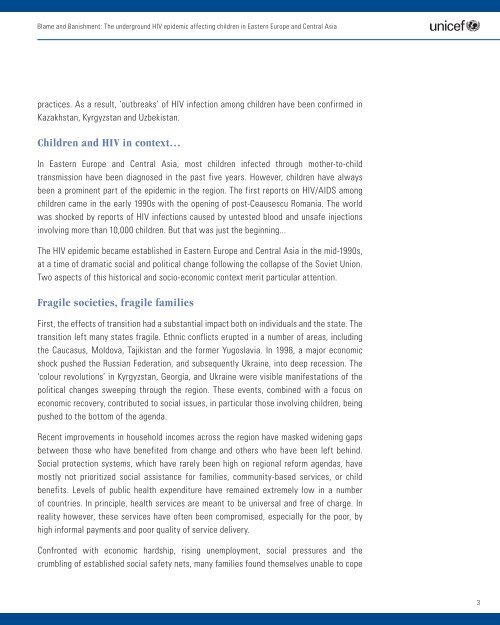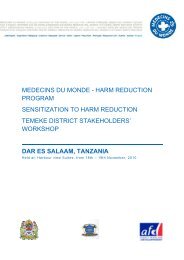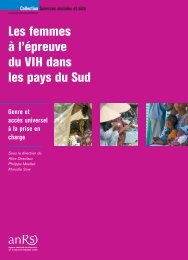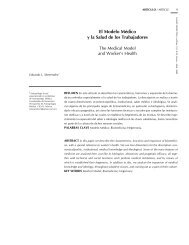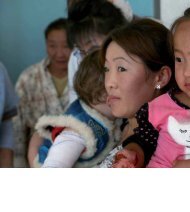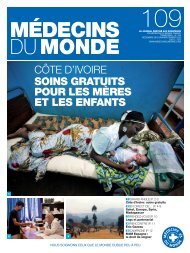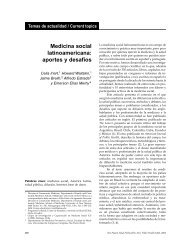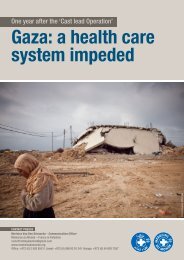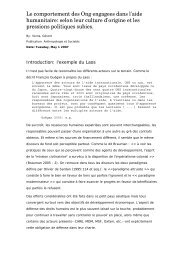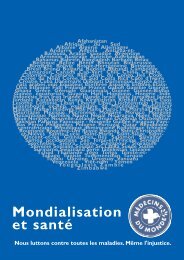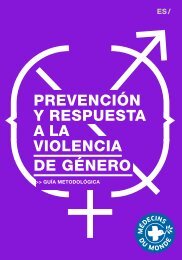Blame & Banishment - Médecins du Monde
Blame & Banishment - Médecins du Monde
Blame & Banishment - Médecins du Monde
You also want an ePaper? Increase the reach of your titles
YUMPU automatically turns print PDFs into web optimized ePapers that Google loves.
<strong>Blame</strong> and <strong>Banishment</strong>: The underground HIV epidemic affecting children in Eastern Europe and Central Asia<br />
practices. As a result, ‘outbreaks’ of HIV infection among children have been confirmed in<br />
Kazakhstan, Kyrgyzstan and Uzbekistan.<br />
Children and HIV in context…<br />
In Eastern Europe and Central Asia, most children infected through mother-to-child<br />
transmission have been diagnosed in the past five years. However, children have always<br />
been a prominent part of the epidemic in the region. The first reports on HIV/AIDS among<br />
children came in the early 1990s with the opening of post-Ceausescu Romania. The world<br />
was shocked by reports of HIV infections caused by untested blood and unsafe injections<br />
involving more than 10,000 children. But that was just the beginning...<br />
The HIV epidemic became established in Eastern Europe and Central Asia in the mid-1990s,<br />
at a time of dramatic social and political change following the collapse of the Soviet Union.<br />
Two aspects of this historical and socio-economic context merit particular attention.<br />
Fragile societies, fragile families<br />
First, the effects of transition had a substantial impact both on indivi<strong>du</strong>als and the state. The<br />
transition left many states fragile. Ethnic conflicts erupted in a number of areas, including<br />
the Caucasus, Moldova, Tajikistan and the former Yugoslavia. In 1998, a major economic<br />
shock pushed the Russian Federation, and subsequently Ukraine, into deep recession. The<br />
‘colour revolutions’ in Kyrgyzstan, Georgia, and Ukraine were visible manifestations of the<br />
political changes sweeping through the region. These events, combined with a focus on<br />
economic recovery, contributed to social issues, in particular those involving children, being<br />
pushed to the bottom of the agenda.<br />
Recent improvements in household incomes across the region have masked widening gaps<br />
between those who have benefited from change and others who have been left behind.<br />
Social protection systems, which have rarely been high on regional reform agendas, have<br />
mostly not prioritized social assistance for families, community-based services, or child<br />
benefits. Levels of public health expenditure have remained extremely low in a number<br />
of countries. In principle, health services are meant to be universal and free of charge. In<br />
reality however, these services have often been compromised, especially for the poor, by<br />
high informal payments and poor quality of service delivery.<br />
Confronted with economic hardship, rising unemployment, social pressures and the<br />
crumbling of established social safety nets, many families found themselves unable to cope<br />
3


